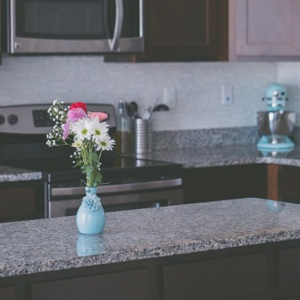Quartz vs Granite Countertops

Natural Granite vs. Engineered Quartz
Granite is a natural stone quarried straight from the Earth’s surface and shipped straight to your home. This is considered slightly more “green” because there is no emissions involved in the manufacturing process. Granite slabs are cut from the Earth then again cut down to fit inside the home. Although it can be a wasteful process, its truly a fine line to say one is less green than the other.
Quartz slabs are a man-made material. Its actually made up of mostly crumbled Quartz 90% then a small amount 10% of a bonding agent, called resin. The ground Quartz, resin and pigment are blended together and voile, you have yourself a kitchen counter.
Tough Stuff – Comparing Durability of Granite vs Quartz
Quartz is engineered, but this is a major plus, when it comes to durability. The word indestructible is often used in the description of Quartz. It is one of the hardest (non-gem) stones around. Combined with the polymer resin in manufacturing makes it one tough stone. Glossy by design, the smooth surface fends away bacteria naturally., making it an easy to clean. The non-porous surface also prevents stains from settling. Warm soap and water with do the trick when cleaning the surface, another plus when it comes to family living.
Granite is a naturally durable stone ranking 6-7 on the Mohs scale of mineral hardness. It is considered one of the most durable naturally occurring stones. Granite does run the risk of chipping if hard objects contacts it with force. Beveled edges is one practical solution that may protect countertop edges from chipping. Granite can also handle the heat from a hot pan. Convenient when the stovetop is full and additional workspace is needed. The highly porous nature of Granite leaves it vulnerable to bacteria living in cracks and crevices. Warm soap and water as well as some store bought cleaners including isopropyl alcohol. A good sealer on the surface is a practical way to prevent stains and germs from multiplying.
Comparing the Aesthetic of Quartz vs Granite
The appearance of Quartz is dependent upon the level of size of blended ground Quartz. Small stones equal an evenly clear surface, while larger specks product more of a random natural stone-like variance. One fun feature of Quartz is its ability to be pigmented. Adding red or blue to the manufacturing process creates a fun countertop in a modern or lively design. For homeowners who love the look of natural stone, Quartz can also be made to mimic other stones. For instance, manufacturers can produce a slab that looks identical to the pattern of a marble or granite.
Granite being a natural stone is full of interesting patterns, veining and colors ranging from white to golds, to black. Small specks of stones are evident in any pattern chosen. Most granite stones are full of incredibly detailed patterns. Quartz and Granite have pros and cons in every category. From the quarrying and manufacturing to the durability and finally how the stone fits into your desired decor.
Learn more about Granite

